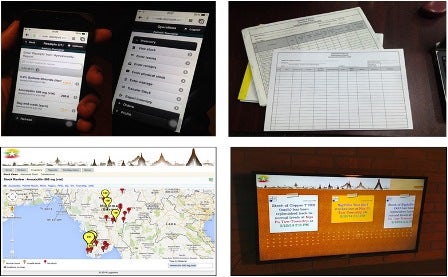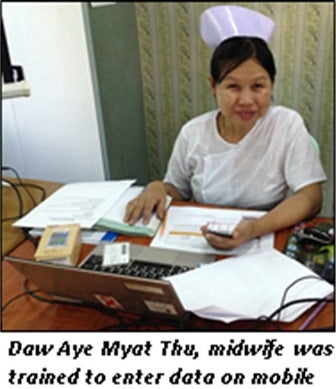Providing women and families across Myanmar with better access to choices in reproductive health services and products are the key aims of a three month pilot study for a standardized and digital national logistic supply chain system, backed by UNFPA in partnership with John Snow Inc. and Myanmar's Ministry of Health.
he study took effect in mid-September and will run until December 2014. It is being piloted in twelve townships and four states and regions (Ayeyarwaddy, Mandalay, Southern Shan and Yangon). Approximately 700 health workers such as midwives, health assistants and other health service providers are participating in the pilot study. It will cover 10% of the country.
One focal point from each of the participating 12 pilot townships, or 57 health centres, has received training on how to enter data into the fully automated computerized operating system or the Reproductive Health Commodity Logistics System (RHC-LS). The current practice within Myanmar on measuring stock level of health commodities is done manually through a paper based reporting system. In addition to the paper reports being entered into the automated system, 9 health providers have been shown how to operate the system via a specially devised application (app) known as “Logistimo” to use on their mobile phones.

Daw Nant Pattein, a female health worker from Dedayae Township in Ayeyarwady is one of the lucky 9 persons whom are actively testing the user friendliness of the digital Logistimo application (app) on her mobile phone devise.
Within the three day training session held in Dedayae Township in early September she quickly learnt, much to her delight, how to use the digital supply chain system in real time.
The supply chain system, once operational will identify reproductive health stakeholders and alongside agreed responsibilities. The system will help keep track of existing stock levels of medical products, storage facilities, distribution of goods including identifying where supplies are needed and how much is required and distributed to the right locations. This will help minimize and avoid stockpiling, as well as properly track stock to prevent products from going missing or supplies getting too low. Expiry dates can also be closely monitored to make efficient use of supplies. Once the pilot project has been completed, the findings will be reviewed and implemented nationwide.

“This automated supply chain system will allow for the user in real time to physically track existing stock levels as well as show where stocks a lacking commodities within the piloted areas. Thirty reproductive health commodities are currently included in the pilot, but the aim is to once it is fully up and running, more can be added,” said Ms. Janet Jackson, UNFPA Representative of Myanmar. “This new system will help improve Myanmar’s health system.”
UNFPA is partnering with the Ministry of Health, John Snow International and Relief International on this innovative ‘pilot within a pilot project’, with the aim of catapulting Myanmar into the digital age and overhaul the country’s supply chain system starting with 31 different kinds of reproductive health products.
Prior to the September launch of the three month pilot study several national logistics system design consultations were organised out throughout 2013 and 2014 in order to agree on a vision for the system, and design standard tools and processes for managing information and commodities, including a Logistics Management Information System (LMIS). Key finding from these deliberations was transcribed into a standard operating procedures (SOP) manual was which was approved by the Ministry of Health (MoH).



